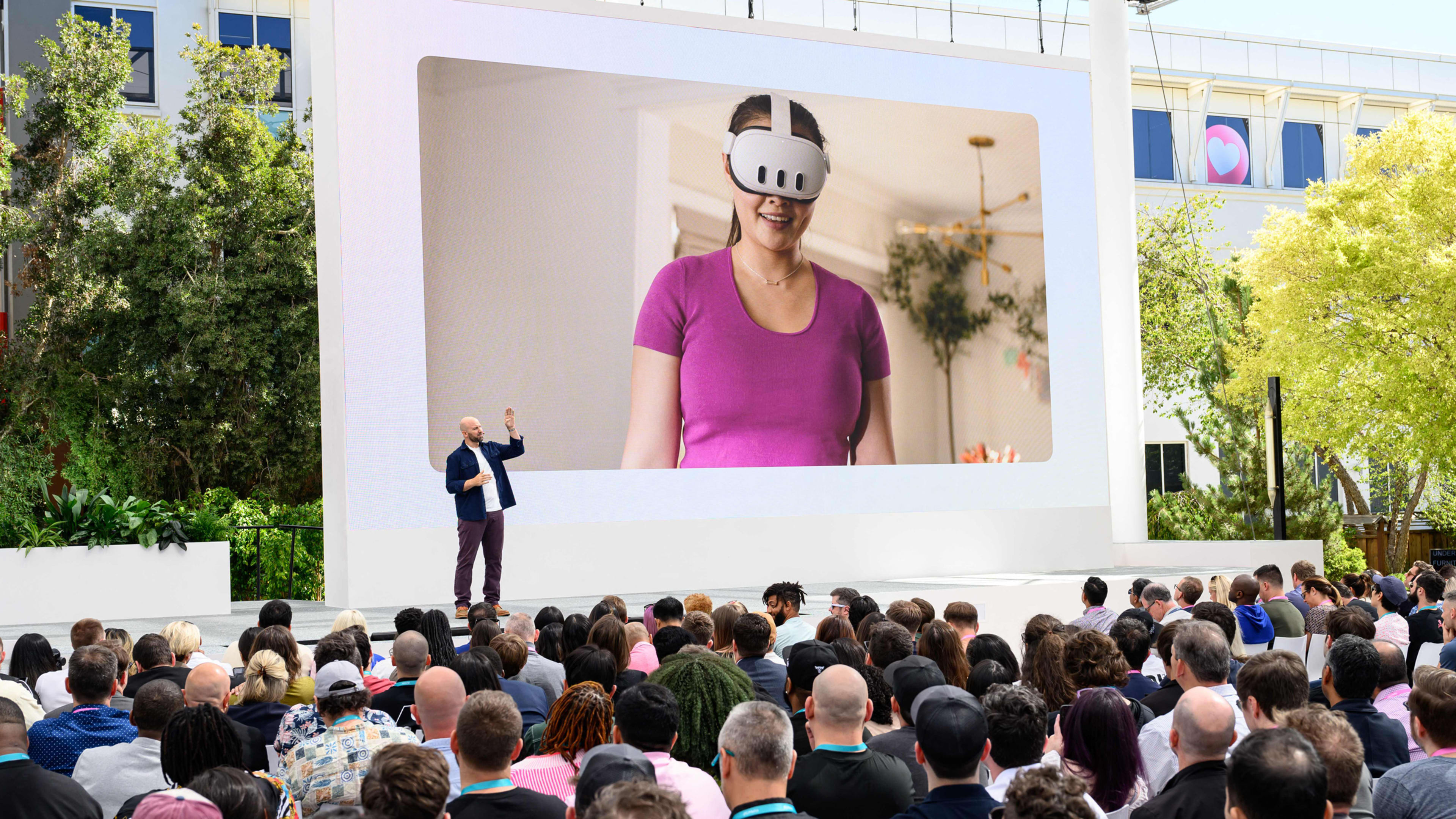Meta CTO Andrew Bosworth didn’t mention Apple by name when he took the stage at the company’s annual Connect developer conference in Menlo Park, California, on Wednesday, September 27—but the competitor was clearly on his mind when he introduced Meta’s new Quest 3 device as “the best-value spatial computing headset on the market for a long time to come.”
Meta’s Quest 3 headset will start selling for $500 next month. Apple’s Vision Pro headset, which the company has called its “first spatial computer,” will cost $3,500 when it becomes available next year.
“I wasn’t trying to be subtle,” Bosworth admitted during a conversation later that day. As if to drive home the point that Meta was itching for a fight, he added: “We could have built a $3,500 headset. We just never considered it.”
With next year’s launch of the Vision Pro, Apple is emerging as Meta’s most serious competitor in the nascent space of spatial computing. Both companies are building immersive mixed-reality headsets today, and both are eventually looking to sell lightweight AR glasses to consumers. At Connect, Meta put on display how it intends to win that competition: By being cheaper, faster, and more gaming-focused than the iPhone maker.
For Meta, affordable hardware is key
Apple’s Vision Pro headset has been hailed by those who have tried it for its stunning visual clarity and other technical feats, including impressive hand tracking. The device is also equipped with face- and eye-tracking sensors, as well as an outward-facing display that is meant to make using it less alienating to bystanders.
Adding all this cutting-edge tech to the device is expensive, necessitating a higher cost, which in turn can limit the appeal to consumers. “Price is extremely important, even for Apple,” says Moor Insights & Strategy analyst Anshel Saag.
Echoing a common sentiment among industry observers, Saag doesn’t think the Vision Pro is intended to be a consumer device. Instead, it’s meant to appeal to developers and well-off early adopters. He’s nonetheless worried about the precedent Apple is setting with all these premium features and the associated $3,500 price tag. “One of the biggest problems Apple has to anticipate is the gap between Vision Pro and whatever lower-cost headset comes [next],” he cautions.
Meta has long been selling affordable VR hardware alongside higher-end devices. The company was first to introduce a $100 VR visor for smartphones in 2015, and launched a $200 stand-alone headset in 2018. Meta’s biggest hardware success story to date has been the $300 Quest 2, of which it sold a reported 20 million units. Next year, the company is rumored to debut another low-cost Quest device.
“We care about features,” Bosworth said. “We care about great experiences. We also care about making this thing something that regular people can reasonably afford and get into.”
Getting AR and VR right takes lots of tries
Patent filings suggest that Apple has been working on AR and VR products since 2007, the year the original iPhone launched. Much of that development has been happening in secret, and we likely won’t see the results of the company’s AR glasses efforts for a number of years.
Meta’s approach has been more iterative and public-facing. The company has released a total of nine different VR headsets to date, and it has regularly been giving developers glimpses at experimental prototypes. Meta also released a first set of smart glasses in collaboration with Ray-Ban maker EssilorLuxottica in 2021, and unveiled a follow-up model at Connect this week. These glasses don’t have a built-in display, but are equipped with cameras for photo and video capture as well as speakers and microphones for listening to music and AI assistance.
“A bit of a cliche in our industry is that you only get the technology right in the third generation,” Bosworth said. Smart glasses like those released this week help Meta understand and solve problems around comfort and durability even before AR glasses technology is mass-market-ready, he argued: “There’s no substitute for getting those [first-generation devices] out and building from there.”
Gaming is a VR success story
Apple has been positioning the Vision Pro as a computer replacement, capable of displaying several large-scale virtual monitors as part of an immersive workspace. The company has put much less emphasis on immersive games as a use case, and its decision to ship the Vision Pro without handheld controllers has divided game designers.
Meta by contrast, has wholeheartedly embraced gaming as the most popular activity on its Quest VR headsets; the company even built out its own game publishing arm, which has helped finance hundreds of VR games. Meta executives announced this week that the Quest app store, which is dominated by games, has generated $2 billion in revenue to date.
Meta’s bet is that gaming can be a kind of gateway drug for other spatial computing use cases, including fitness, creativity, and even work—much like consumers embraced their mobile phones as cameras and music players first, only to use them additionally for work tasks as well.
It’s an approach that makes sense, even to enterprise AR and VR developers. “We see Quest 3 driving a new wave of enterprise interest,” says Campfire CEO Jay Wright, whose company announced this week that it is bringing its enterprise collaboration platform to the device. “The fact it’s a consumer-focused device helps. Users will be more willing to try a device for work if they have an interest for fun.”
Recognize your brand’s excellence by applying to this year’s Brands That Matter Awards before the final deadline, June 7.
Sign up for Brands That Matter notifications here.
